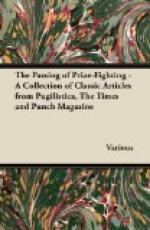I’m told it was an A.D.C. who called attention to the difficulty of milk supply. This was a popular suggestion; it was just the sort of difficulty a soldier loves. In the bare and arid circumstances of the new camp there was no milk supply. “Buy one,” said the Highest Authority, and again the thing was as good as done, except for the C.C., who had to think out a cow, so to speak, with regard to its purchase, equipment, transport, housing, maintenance and education. A man of infinite variety, the arrival of the cow (in bulk) found the C.C. nonplussed. He could not even begin to solve the food question. To him it seemed there were only two alternatives for the beast: bully beef or ration allowance at three francs a day in lieu of rations. The cow, he was told, was entitled and likely to refuse both.
We all crowded round the C.C. to help. “As to a simple matter like food,” said A. and Q., “the Lord will provide. But as to the more difficult and complicated matters of establishment we will issue your orders.” These ran: “Reference COW: (1) This unit should be shown on your Weekly Strength Return, with a statement of all casualties affecting same. Casualties include admission to or evacuation from hospital; change of address; marriage, and leave to the United Kingdom. (2) To be brought on the proper establishment of H.Q., it should be shown as ‘Officer’s Charger, one,’ and should be trained and employed by you as such. (3) Please report action taken, and whether by you or by the Cow.”
Even as the C.C. was contemplating this communication and hearkening to the cow grumbling away in his front-garden, his old regiment took occasion to march through the village and, in so doing, added insult to injury. The regiment had a mascot; the mascot was a goat; the goat fell out on the march and went sick. It did this in that portion of the C.C.’s front garden which was not already occupied by the cow, and its orders from the Colonel, who was its C.O. and had once been the Camp Commandant’s C.O., were to remain with the C.C. and upon his charge till called for. This is all a very true story, but it’s poor rations I’ll be getting from the C.C. during what remains of this War for divulging it.
Be anything in the military world you like, Charles, from a courtly General to a thrusting Loot in charge of some overwhelmingly important department or other, but do not be a Camp Commandant. As there is no terrible complication which may not occur in the life of such, so there is no bitter irony which may not follow all. The early afternoon of April 6th found the C.C. on the site of the now camp, surrounded by confusion and an angry crowd of experts. There had been words and more words; there had only just not been blows, and all with regard to this wretched and incessant subject of April 7th. The C.C., never broad-minded on the point, had become positively ridiculous and tiresome about that irrevocable date, April 7th. It was a dull subject in any case, said the experts, but in the circumstances it was inane and cruel to go on insisting on it. R.E., Lorries, Signals and all their suites, not having been on too friendly terms among themselves these latter days, were fast becoming united in their intense loathing of the C.C. and his everlasting and impossible April 7th.




